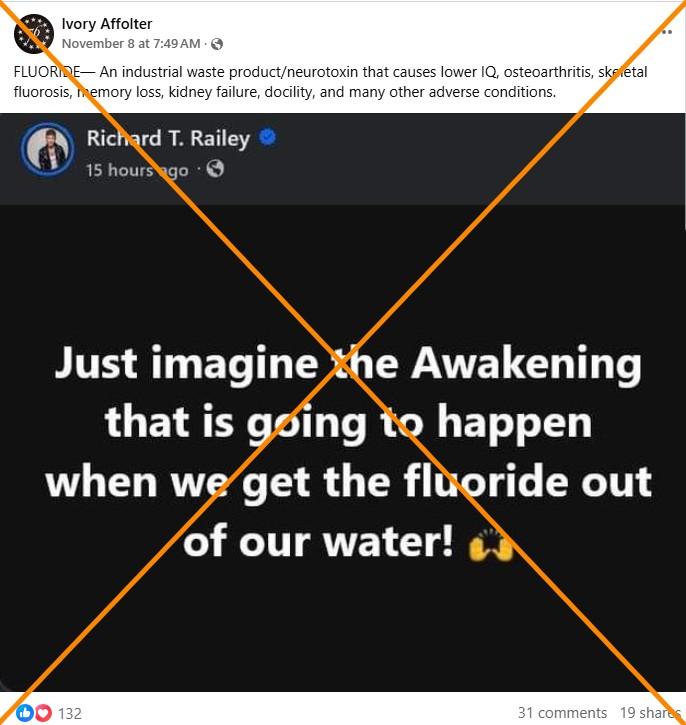
Resurgent claims lack context on fluoridated water harms
- This article is more than one year old.
- Published on November 13, 2024 at 18:32
- 4 min read
- By AFP USA
"In case you didn't know, fluoride has been directly linked to many different neurological issues so the fact that the Trump administration is going to remove fluoride from our water supply is a massive deal," says the speaker in a November 5, 2024 Instagram video.
The clip includes a screenshot of a November 2 X post from Kennedy which claimed Donald Trump would back the removal of fluoride from all US water systems due to the purported adverse effects on health.
Over the following days, as election results confirmed Trump as the president-elect, other users on Facebook, Instagram, X and TikTok latched on to Kennedy's claims and reignited longstanding misinformation about the harms of fluoride consumption.


Kennedy spread multiple dubious health theories as he pursued the presidency. He suspended his campaign in August while simultaneously endorsing Trump, which was followed by public speculation about Kennedy's eventual appointment at a federal food or health agency. The president-elect had not formally tapped him for a role at the time of publication on November 13.
Claims about the negative impacts of fluoride consumption have circulated for years, including some fact-checked by AFP.
Researchers continue to examine hypotheses about the potential harms of fluoridated water and have presented studies suggesting that high levels of exposure could lead to health problems. However, the American Dental Association (ADA) maintains community water fluoridation as safe and effective at preventing tooth decay (archived here).
"It's a matter of how much, and if it's just a little, it's not dangerous at all," said Howard Pollick, a professor in the School of Dentistry at the University of California, San Francisco (archived here).
Neurological evidence
Fluoride is a naturally occurring mineral found in rocks, food and water sources (archived here). Pollick, who was previously an ADA fluoride spokesman, said it is used in products such as fertilizer and silicon and therefore could appear in industrial waste.
Known for decreasing the risk of cavities (archived here), fluoride is present in most toothpastes and is added to certain public water systems across the US in an effort to increase widespread resilience to tooth decay (archived here).
The US Department of Health and Human Services (HHS) recommends an optimal fluoride level between 0.7 and 1.2 milligrams per liter of water (archived here). The Centers for Disease Control (CDC) reported in 2023 that almost every community fluoridated water system observed in the United States measured under 2 milligrams per liter (archived here).
Pollick said that some natural water reserves contain levels of fluoride above the US Environmental Protection Agency's (EPA) secondary standard of 2 milligrams per liter and that nearby residents are advised not to let children drink from these sources (archived here).
A 2024 report from the US National Toxicology Program (NTP) found insufficient data to support claims of negative impacts on children's IQ when fluoridation levels are lower than 0.7 milligrams per liter (archived here). But the review concluded with "moderate confidence" that there is evidence of an association between fluoride levels greater than 1.5 milligrams per liter and lower cognition in children (archived here).
The review did not find any evidence that fluoride exposure had a negative impact on adult cognition.
In September 2024, a federal judge ordered the EPA to take additional measures to regulate fluoride in drinking water (archived here).
Teeth and bone health
While federal agencies such as HHS and EPA make recommendations for fluoride levels in water, fluoridation programs are regulated by local governments.
Higher levels of fluoride exposure -- especially among children -- can lead to dental or skeletal degradation known as fluorosis (archived here).
As is the case for many substances found in the natural environment "there's an optimum level that below which is not good and above which is not good," Pollick said.
According to the American Cancer Society, most of the research examining possible links between fluoride exposure and cancer -- particularly osteosarcoma -- presented "uncertain" or insufficiently strong evidence (archived here). The charity still mentions a need for further research to explore any potential connection.
A 2024 review from researchers in the United Kingdom assessing studies examining fluoride's possible association with bone cancer found that 12 out of 14 included papers did not establish a clear link between the mineral and the disease (archived here).
Worldwide fluoride use
Globally, fluoride is added to water supplies in an estimated 25 countries. But it is not used in many others, notably in Europe, where public health authorities have expressed concerns about potential health impacts.
Before fluoridated water was introduced as a public health initiative, researchers found communities with higher levels of natural fluoride in their water sources experienced less tooth decay (archived here). More recent research indicates that terminating public fluoridated water programs increases local cavity rates.
Lindsay McLaren, a professor of population and public health at the University of Calgary (archived here), penned a study that found the Alberta city's children were developing more cavities after local authorities stopped fluoridating its drinking water (archived here). She said she was "not convinced" of harm from fluoride beyond fluorosis.
"That can be serious at very high levels," McLaren said. "We're talking way, way higher than the concentration that's used in organized community water fluoridation."
Local media reports Calgary plans to reintroduce fluoride to its drinking water system as community support for the return of the initiative has mounted, but implementation is delayed due to infrastructure complications.
Read more of AFP's reporting on health misinformation here.
Copyright © AFP 2017-2026. Any commercial use of this content requires a subscription. Click here to find out more.
Is there content that you would like AFP to fact-check? Get in touch.
Contact us
